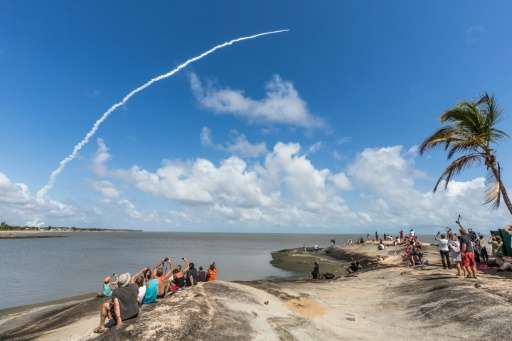Europe's own satnav Galileo goes live (Update)

After 17 years, numerous setbacks and three times over budget, Europe's Galileo satnav system went live Thursday, promising to outperform rivals and guarantee regional self-reliance.
Initial services, free to users worldwide, are available only on smartphones and navigation units fitted with Galileo-compatible microchips.
Some devices may need only a software update to start using the service, according to the European Commission, which funds the 10 billion euro ($11 billion) project.
"After years of intense work, we are ready to declare the initial services of Galileo," EU Industry Commissioner Elzbieta Bienkowska announced in Brussels.
"We are joining the closed club of providers of navigation services."
With 18 satellites in place so far, Galileo's signal will be intermittent at first, requiring a boost from satellites in the American GPS system.
But it will grow more reliable and independent over time as orbiters are added to the network circling 23,222 kilometres (14,430 miles) above Earth.
Its proud parents, the commission and European Space Agency, said Galileo should be fully operational by 2020, providing time and positioning data of unprecedented accuracy.
People have become increasingly reliant on geo-localisation for anything from finding bars, pharmacies or the shortest holiday route to tracing parked cars or lost Alzheimer's patients.
Ultimately, Galileo's free Open Service will be able to pinpoint a location to within a metre (just over three feet), compared to several metres for GPS and Russia's GLONASS.
A paying service will provide even more precise data, to within centimetres.
Strategic priority
Such precision would be invaluable for safer driverless cars and nuclear power plants, for example.
"When fully operational, Galileo's Search and Rescue service will reduce the time it takes to detect a person lost at sea or in the mountains from three hours to just 10 minutes after a distress beacon is activated," the Galileo website says.
Its signal will eventually reach areas where none is possible today—inside traffic tunnels and on streets where high buildings shield radio waves from satellites flying low on the horizon.
For now, free use is only for owners of two Galileo-compatible cellphones (BQ's Aquaris X5 Plus and Huawei's Mate 9), and about a dozen types of Galileo-ready chips produced by Qualcomm, Broadcom, Intel, Mediatek and u-blox.
A list of Galileo-enabled products can be consulted at www.useGalileo.eu.
"We need the businesses to invest in and innovate with Galileo. To create new applications, new services," said Bienkowska.
The civilian-controlled service is of great strategic importance for Europe, which relies on two military-run services—GPS and GLONASS, which provide no guarantee of uninterrupted service.
Named after Italian astronomer Galileo Galilei, the project was first approved with an initial budget of around three billion euros and plans to be operational by 2008.
It suffered several technical and budgetary setbacks, including the launch of two satellites into the wrong orbit in 2014.
Its total cost until 2020 is now calculated at about 10 billion euros.
The European Commission expects the project will ultimately be an important commercial venture, adding some 90 billion euros to the EU economy in its first 20 years.
Almost 10 percent of Europe's gross domestic product is thought to depend on satellite navigation today—a figure projected to grow to about 30 percent by 2030.
The system's groundbreaking accuracy is the result of the best atomic clocks ever flown for navigation—accurate to one second in three million years.
Galileo will also have stronger signals carrying more information, its makers say.
Europe's Galileo satnav: a rocky road
Europe's Galileo satnav system, first approved in 1999, had a difficult birth—taking 17 years and more than triple the original budget to get to the point of going live.
Here's a look at the bumpy road to this week's expected launch of Galileo's initial services:
- December 1999: The European Commission formally approves Galileo, a joint project with the European Space Agency, with a budget of between 2.2 billion and 2.95 billion euros ($2.34-3.14 billion). The project "to safeguard European strategic needs" is set for completion in 2008.
- April 2008: After failing to raise private sector funding, the Commission—the European Union's executive—takes over the project with a new estimated budget, entirely taxpayer-funded, of 3.4 billion euros until 2013. A further 7 billion euros is budgeted for the 2014-2020 period, according to France's CNES space agency, an ESA member.
- October 2011: The two first Galileo satellites are launched into orbit, followed by two more in 2012.
- March 2013: These four satellites pinpoint the system's first-ever ground location, with an accuracy of between 10 and 15 metres (32 to 49 feet). One of the orbiters develops antenna problems, but can still transmit on one frequency.
- August 2014: After a more than year-long delay over "technical difficulties", satellites five and six are launched into a lopsided, elliptical orbit of little use for satellite navigation. Subsequent launches are delayed to investigate the cause—frozen fuel pipes onboard the Russian Soyuz rocket.
- December 2016: With 18 satellites in orbit, Galileo finally goes live on December 15. The commission has already ordered eight more orbiters, for launch in 2017 and 2018, with the last four in the 30-satellite constellation yet to be confirmed.
© 2016 AFP



















